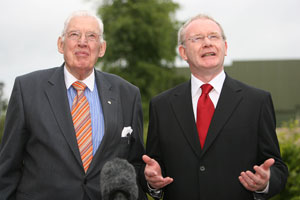19 July 2007 Edition
The momentum must be kept up

Ian Paisley and Minister Martin McGuinness speaking before the meeting of the All Ireland Ministerial Council
By Mícheál MacDonnchaThe first meeting of the All-Ireland Ministerial Council in Armagh on Tuesday was one of the most significant gatherings held in this country for many years. Yet it was not greeted by the world headlines and national saturation coverage that accompanied previous key events in the Irish Peace Process. That in itself tells a tale about the progress which has been made.
There is a sense that matters have advanced so far that such meetings are now almost routine and that politics have ‘settled down’ in the Six Counties. That sense of things was certainly helped by the relatively quiet Twelfth period which preceded the Armagh meeting.
There was significant progress made in Armagh, albeit long overdue progress. Projects for improved road infrastructure in the North West were advanced and the long-awaited green light was given for the restoration of the Ulster Canal. There were moves to set in train the establishment of the All-Ireland Parliamentary Forum and the and the Consultative Civic Forum. Both of these bodies were promised under the Good Friday Agreement. It was significant also that the Council committed itself to a schedule of future meetings, something that was effectively impossible in the past, in a process dogged at every turn by the crises within unionism and the pandering of the British government to unionist obstructionism.
It was all a very different picture in Armagh on Tuesday and for many people it is still almost incredible that Ian Paisley and the DUP have been brought to the position of working the institutions established under the Good Friday Agreement. It is almost incredible but very welcome in an atmosphere where conflict has diminished nearly to vanishing point and political progress seems possible as never before.
There is a danger of complaceny in all of this.
Governments in Dublin and London will be tempted to put the process in a lower gear and to delay or avoid further difficult decisions that they have to make. There is a danger that the British government will not come up with the very substantial financial package that is required to restore the economy in the Six Counties. There is a danger that the Irish Government will not push the all-Ireland agenda and do the heavy lifting in terms of building the island economy and integrating public services that only it can deliver. The reluctance of the Irish Government to co-operate across the island in any extensive way in the area of healthcare is a case in point.
It is now seen by Bertie Ahern as clearly in his political interest to present ‘the North’ as ‘sorted’. Before the General Eelction he claimed that with this done he would devote more of his time to the health services in the 26 Counties. Not much of this has been heard since the election but the point was clear. He feels that the pressure is off and that most people will be more than satisfied with the smiling pictures of Bertie and Big Ian. A mutual DUP/FF interest to slow down the process may be developing.
It is Sinn Féin’s role to ensure that the momentum is kept up. It is over nine years since the Good Friday Agreement yet only now is its potential beginning to be realised. Progress needs to be accelerated on every front in the social and economic interest of everyone who shares this island.
Partitionism in the 26 Counties needs to be confronted – the mentality that says we ‘can’t afford’ a united Ireland. We need to intensify our dialogue with unionism, seeking to convince key sections of the population who still maintain that ideology that new thinking is required. These are big challenges but there has never been a more positive climate in which to meet those challenges.


